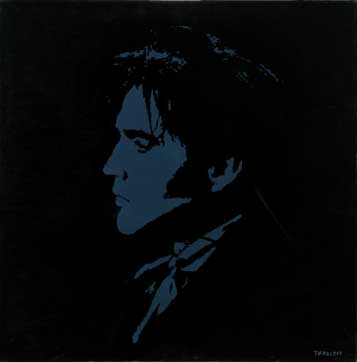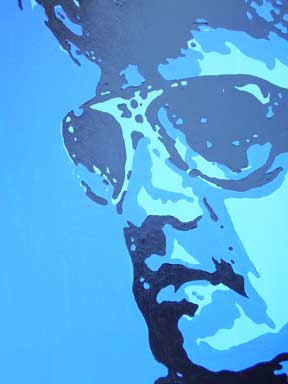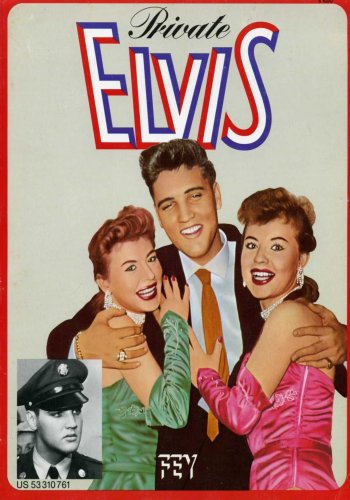(painting by Martin Torsleff, www.martintorsleff.com)Elvis, Private and Inscrutable
In 1978, a year after Elvis Presley’s death, came the publication of the single weirdest book ever published about the King of Rock ‘n’ Roll. Private Elvis, by Diego Cortez, is mostly a picture book, filled with black and white photos taken by Rudolf Paulini during Private Presley’s nights out on the town while stationed in Munich, Germany. Most of these depict him in a bleary-eyed state with various women he met in the night spots he frequented. Reader comments about the book on Amazon are far from gracious, most of them recoiling at the homeliness of the fairer sex flocking to Elvis in the photos. Those are a bit overboard, but the females depicted, far from being as hideous as the readers claim, are simply rather ordinary, plain Janes, neither strikingly attractive nor revoltingly ugly. A few are showgirls, and in fact these tend to the least alluring of the lot. But the main feature of the images is Elvis’s detachment from his surroundings. To the extent one can read into his expression, he is either inebriated, stoned or excruciatingly bored, or a bit of all three.
The little bit of text accompanying the photos is something else again. In contrast to those Elvis fans who unquestioningly accept and adore all things Elvis—even “Old MacDonald”—and deny what Ernst Jorgensen refers to as “the erratic logic” of his recording career, Diego Cortez and his collaborator Duncan Smith go off the deep end the other way, turning themselves into the literary equivalent of Woody Allen’s girlfriend’s brother in Annie Hall, who reveals to Woody’s character his desire to drive straight into oncoming traffic. Fittingly, the brother is played by reigning cinematic psycho Christopher Walken. In Private Elvis, Cortez and Smith drive straight into the oncoming traffic of existential blarney, and then some, making of themselves the Christopher Walkens of the Presley dialectic. In the end, though, their often recondite interpretations of the meaning and import of the minutiae of Elvis’s existence and its societal reverberations, merit at least grudging admiration for their energy and vitality, even if the vehicle does careen headlong into oncoming traffic. Herewith, three separate encounters with Messrs. Cortez and Smith. Read, and believe. –David McGee
Crypt Analysis
By Duncan SmithDid this memory of a crypt work its way into Elvis’ music? His photo image was a doubling but the music worked differently. To begin with, each of his records bears the cipher, Elvis Presley, an inscription on the monument of his voice, written on wax. This voice, once uttered from a body, is no longer coming from an Elvis as if he were in concert. No longer being immediately delivered, it stands as an echo, frozen and still, playable over and over again. Removed from real life, it has hidden that life and rendered it inaccessible. His voice, on record, is now a crypt of its past vitality. As well, we attempt to summon Elvis’ voice as something real and present before us. We then exercise a violent desire that tries all sorts of schemes. We may first of all re-sing Elvis, and then if we are really hardpressed, we can imitate him.
The lips exercise the greatest interest: sensitive and anemone-like, their history of personal catastrophes shows his body at its most nervous, excitable, alert. To kiss the corpses that litter his past has produced a mouth of unending reverberation.
When we re-sing Elvis’ songs we are following the strange paths that the crypt has begun. Elvis’ absence (he’s not here or he’s actually dead) makes the impulse to touch him, even to have his body inside ours, all the more acute. Since his body cannot actually enter ours, we fill our mouths with him, that is, his own words. We are empty-mouthed. But the oral desire is silent, intact in a crypt we have made. It then fails to overcome the silence and therefore speaks in spite of the quiet. We let the Elvis object enter our bodies, though only by filling the void in our mouths.
Why are there imitators of Elvis? Their numbers are great. Rick LoRanc, in particular, characterizes these actors who can amaze us with their likeness to the real person. Who is responsible for these duplicators of his image? Elvis has certainly left behind much that could be carefully copied. Imagine the hours spent with such relics with the intent to reproduce their effects. The relics are then no longer themselves, they are elsewhere, they have escaped from sealed monuments. The original Elvis is no longer intact, safe in the vault of films and music: his is now non-original, displaced from the center. This is ventriloquism: the crypt has let loose a ghost. Elvis no longer owns Elvis. The double that he trans-acted has been stolen, forfeited. And it will haunt the man from out of the property that is his self-made burial. Do not all ghosts live in cemeteries and frighten the living who wish to visit the dead? (As one fan symptomatically slipped, “I love him. He was fantastic. He was so down-to-earth.” Her testament to a spirit, who was so close to earth, and when uttered, Elvis was ready for internment.) Elvis’ audience shudders at this mime, yet relishes in secret the theft. One despises the graverobbers of the Egyptian pharaohs and then at the same time we indulge in clandestine fashion a forbidden pleasure that those treasures could have been our own.
What will imitators have to calculate to the greatest degree: his face, dollish, shiny; lips, pliant, rubbery; the eyes, his most feminine trait. The lips exercise the greatest interest: sensitive and anemone-like, their history of personal catastrophes shows his body at its most nervous, excitable, alert. To kiss the corpses that litter his past has produced a mouth of unending reverberation. A muzzle that shows a signature so hard for imitators to perfect. Can they surmount its feather intelligence before fading us into a dangerous recall?
DIALOGUE
Diego Cortez and Duncan Smith
February 1978, MemphisDUNCAN SMITH: See, when I was doing these notes on Derrida’s ‘Fores,’ I checked up on a lot of the sources he took from Freud. And, apparently in Freud’s essay, ‘Negation,’ he talked about how the ego rejects—it’s related to this concept whereby it takes all that’s good inside from an environment, and projects all that’s bad—expelling it outside.
DIEGO CORTEZ: Where does the bad come from?
SMITH: Well, that’s what I’m saying. Elvis is so fantastic. He’s so great. He’s just so neat. So you take all of Elvis inside. So, this is a form of Elvis-introjection, and is a source of pleasure. To imitate Elvis, as Christ, is to produce happiness in other subjects. Rejection of Elvis is nearly impossible. You can’t reject Elvis, because he’s just so good. Too much pleasure is what our egos want to take in. He’s always so happy, confident, talented, handsome, has money, beautiful women. There’s so much about Elvis that we want to take in.
CORTEZ: Yeah, but come on, between you and me, at least for me, there’s a lot of Elvis that represents a lot of horrible things: religion, family, male chauvinism, um…the military.
SMITH: Exactly, but the thing is we have to look at it from the standpoint where we ask what kind of identification apparatus is he setting up when he performs, when we see him in films, when we hear his music, and then obviously things become totally different as a result of his death. I mean there’s a different kind of identification apparatus that’s going on.
CORTEZ: What is it? What is the new apparatus? This post-mortem identification…
SMITH: Well, the fact is, here we go (reads from a prepared text): ‘By what violence was Elvis’ crypt produced? …unconscious knowledge that his body is gone into a vault, hence rendering any real physical contact impossible. Sexual appropriation of Elvis, while living, becomes violently distorted into a forbidden fantasy. To hold Elvis, now, impossible, but then, still dreamt-of, revived, so that an incorporation, taking him into one’s mouth, or any other orifice, then we’ll use fantasies of incorporation/identification in strange and distorted ways.’ See, for example, right when Elvis died, remember…
CORTEZ: Yes, I do.
SMITH: How did we build Elvis as a result of this violence? How did we build the Elvis crypt as a result of this violence: mass consumption of memorabilia—that violence of buying, acquiring, holding onto objects he created. His death summoned excessive, compulsive behaviors. Elvis was certainly lost, but faith in his products affirms our economic potential. A euphoria over his loss, a euphoria in the potential of capitalist acquisitiveness. Rediscovery of Elvis: ego rediscovers Elvis as a source of pleasure. Its own needs find themselves everpresently denied: obviously, Elvis becomes an object of such great fantasies in every subject who looks at him. We see him being so successful, that we tend to forget, as a result of that fantasy, any other social oppressions that we’re confronted with.
CORTEZ: What are you saying? That it’s a pain/pleasure principle?
SMITH: I’m just saying that people look at Elvis, and they see him as an ideal prototype. He’s just the signifier par excellence of this kind of affirmative capitalist subject, who’s totally immersed in every single component of its ideology, and takes such pleasure in it. Elvis becomes this person that is so representative of all these values, and is enjoying them. He’s at the center of its euphoria. Barthes talks about when one assimilates oneself into bourgeous society, there’s this growing sense of euphoria. You’re accepting the interpretation of reality proper to bourgeois society, and there’s a euphoria in assimilating that understanding. And Elvis is a prototype—he’s a person who enjoys capitalism the most. He’s a person who takes pleasure in it the greatest. We see Elvis as this person who affirms it so totally.
CORTEZ: Okay, so that brings up an issue that I’ve been working with in my film, Greutzi Elvis, and that’s the schizophrenia in Rock ‘n’ Roll: the struggle between a corporate ego and raw terror—anti-corporate terrorism, destructive…
SMITH: In Deleuze and Guattari terms you would say it was a subjugated subject or a subjugated group or a subject group, okay, the most terroristic potential of rock would be the fact that it is able to create a subject group—a unity of people determined to upset the values imposed upon them from outside. Whereas a corporate ego would demand control on all levels, and would relate everything to this hierarchy, to this pyramid of control that’s the corporate ego.
CORTEZ; Yes, but Elvis and Rock ‘n’ Roll, like Punk Rock, encompasses both so thoroughly. I don’t find any model in society that takes both positions with such a severe schizophrenia. Totally.
SMITH: So, it’s like Elvis at the same time, while he’s at the center of capitalist pleasure…
CORTEZ: He’s also creating a kind of anti-capitalist group.
SMITH: What’s he saying to people? He’s saying, “Have fun…this is good…it’s all right…there’s nothing wrong with it,’ and “Smash conventions that militate against it.’ It’s very interesting, because Elvis always made it a point as signing himself as someone who was a good boy…he went to Germany, he was in the army, he went to church, he had a family…
CORTEZ: He supported his parents, he kept close to his parents…
SMITH: But the thing is, that was only by virtue of the fact that he knew if he were not to continue to sustain those values, he would simply be this non-conformist Rock ‘n’ Roll star.
CORTEZ: Elvis seems more of an actor. His whole Rock ‘n’ Roll image is like a movie…he’s playing the part. So he remains ‘normal’ underneath the terrorist façade…he lives a ‘normal life’ and he’s good at playing this role. People can always identify with great actors and actresses even if they play the most threatening roles. But I still think there was something really great, I guess it’s his music, his building this kind of anti-corporate corporation called Rock ‘n’ Roll.
SMITH: Elvis began the quasi-institution of Rock ‘n’ Roll, or rock ‘n’ roll flows. He allowed for the possibility of a rock subject group, not a performance set-up that prevents audience spontaneity, the situation which erupts into unexpected theater. No absolute master who controls all the movement. Elvis started a pleasure that instilled hysteria. He had no intention of limiting the potential ebullience of his audiences.
CORTEZ: He was a real transition figure. To sell this terrorism (content), he had to play the corporate king. Something that shouldn’t be necessary in a well-grounded rock context today. He had to play both roles at the same time. Who knows what his real convictions were? Maybe he felt subversive, maybe he wasn’t conscious of anything, maybe he was manipulated, maybe he was in control, it’s hard to say.
SMITH: He’s also interesting because, even though he assimilated capitalist ideology to such an effulgent status, to where it was just brimming—almost too much pleasure, he stretched it, perverted it (free pink Cadillacs), showed the peripheries of its excessive exchange circuits. Consequently, he subverted ideology by making that ideology all the more pleasurable, all the more replenishing. He really subverted a Puritan ethic.
CORTEZ: Yeah, that was the first attack against him, that he was obscene. That he was this ‘Sexual Pelvis,’ a pornographic…
SMITH: Well, you can fight the system by playing its most decadent, cynical game, in order to get the most pleasure or benefits from it. This is what perhaps Elvis started.
CORTEZ: He never really wrote his songs, did he? I think he was pretty much produced by other people.
‘It’s not like Elvis produced any of it, he’s not the author of Elvis, he is ex-centric to his own Elvishood.’
SMITH: You have to recognize that Elvis was made into an object by others, and he felt a certain sort of pleasure or bliss in recognizing the pleasure that others felt for him. See, he knew, by virtue of his musical talent, his voice, his physical appearance, that he was a signifier for others. Here’s rock terrorism on one hand, and total assimilation—total corporate ego on the other. And it was this desire on the part of others for him to project BOTH extremes simultaneously. Elvis was always aware that he had to recognize himself as a recognition on the part of others. It’s not like Elvis produced any of it, he’s not the author of Elvis, he is ex-centric to his own Elvishood. But others could not accept the alienation effect displacing itself onto another person. Elvis knew of his own duplication, but he also knew that its transgression was impossible because he was, by Law, the original duplication. Elvis’ lawyers insisted on his remaining Elvis; Elvis was only Elvis in signature, in writing, and that was required by Law.
CORTEZ: So, I guess that the Presley schizophrenia that still exists today also has to do with whether Elvis was in control of what he was doing or whether he was being controlled. And he probably had to deal with that split constantly, psychologically, I mean that must’ve been a…
SMITH: That must’ve been a real drain.
CORTEZ: A strain, a drain.
Elvis’ Vocalic Graphic Soma
(A Hungry Mouth)
by Duncan SmithInstead of corprophagic sublimations, Elvis distributions of record-gift-capital-feces, we would have an oral politic not restricted to its analized version.
Adequate Elvis representation becomes a legal question. And it always has throughout his career. Elvis must have relied on a great deal of lawyers in order to secure copyrights. His estate is extensive as a consequence of legal engineering. And what are we given? Reams of scribbles. Talismans that beckon us to desire their lures. By sheer media plenitude Elvis inevitably becomes a subject for others. Elvis erects a sign machine that we cannot avoid or expel in toto from our lives. By image network devices, Elvis impregnates consciousness and leaves trails behind. Paths of his industrial doubling may carry these meanings further than their original intentions. A subjugation to commodities can assume different guises. The paranoia of executives controlling Elvis simultaneously proposes: ‘I hate Elvis, I love Elvis,’ or always contain that ambivalence. They contradict their hegemonic schemes by allowing Elvis to be something they might hate. Thus their primary attempt to bury him in this entertainment image desert (Viva Las Vegas: the capitol of accumulating capital), also meets up with their embarrassment with his audience’s deliriums. Collective celebraition of Elvis’ vocalic graphic soma exceeds an entombment, his rubbing and sifting expelled by his hungry mouth. But the hungry mouth has found its inscription in inert black wax. Its documentation leads us to phantomization, trace enticement, a beautiful fetish ruin sprawled under a blazing sun propelling seductions for future singer-geologists (rock). The infinite Elvis iterations promoted by the ruling class could become its subversion by those sensitive enough to that perpetual re-elaboration.
Instead of corprophagic sublimations, Elvis distributions of record-gift-capital-feces, we would have an oral politic not restricted to its analized version. Will the fecal Elvis promoted by capitalists reveal any internal contradictions? We have bought his gifts, but when will they come to haunt us, make us shiver? Where will the spirit tremble from a fissure in the monument? Wait for the crack and shall it emerge?
Founder/Publisher/Editor: David McGee
Contributing Editors: Billy Altman, Laura Fissinger, Christopher Hill, Derk Richardson
Logo Design: John Mendelsohn (www.johnmendelsohn.com)
Website Design: Kieran McGee (www.kieranmcgee.com)
Staff Photographers: Audrey Harrod (Louisville, KY; www.flickr.com/audreyharrod), Alicia Zappier (New York)
E-mail: thebluegrassspecial@gmail.com
Mailing Address: David McGee, 201 W. 85 St.—5B, New York, NY 10024






